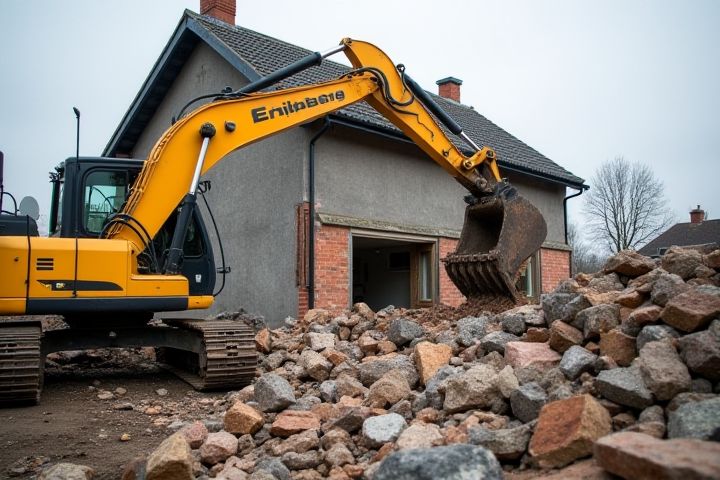
To demolish a house, you typically need a demolition permit issued by your local municipality or county. This permit ensures that the demolition complies with zoning regulations, structural safety codes, and environmental guidelines. You may also need to conduct an asbestos inspection, as hazardous materials must be safely handled and removed before demolition begins. Environmental impact assessments might be required, especially in areas with historical significance or protected ecosystems. Always check with your local building authority for specific requirements and regulations that apply to your project.
What Permits Are Needed To Demolish A House
Demolition permit
To demolish a house, obtaining a demolition permit is essential and typically required by local authorities to ensure compliance with safety and environmental regulations. This permit helps ensure that all utility connections, such as gas, water, and electricity, are properly disconnected before demolition begins, reducing the risk of accidents. In many areas, you may also need to provide a detailed plan of the demolition process, including waste disposal methods and remediation of any hazardous materials, like asbestos. Local zoning laws, building codes, and potential historical assessments may further dictate specific requirements and processes you need to follow before receiving your permit.
Utility disconnection approval
Before demolishing a house, obtaining utility disconnection approval is essential to ensure a safe demolition process. This approval includes disconnecting services such as electricity, water, and gas, safeguarding both workers and nearby residents. You may need to submit a formal request to utility providers, which usually takes 1 to 4 weeks for processing. Moreover, some jurisdictions require proof of disconnection before issuing demolition permits, making this step crucial for compliance with local regulations.
Environmental inspection clearance
Obtaining an Environmental Inspection Clearance is crucial before demolishing a house, as it ensures compliance with local and federal regulations aimed at safeguarding the environment. This clearance assesses potential impacts on surrounding ecosystems, including soil, water, and air quality, and is often mandated by local environmental protection agencies. You may need to submit documentation detailing the proposed demolition plan, including waste disposal methods and contamination assessments. Failure to secure this clearance can result in costly fines and delays in your demolition project, so ensure you complete all necessary evaluations beforehand.
Hazardous material survey
Before demolishing a house, a hazardous material survey is essential to identify the presence of harmful substances such as asbestos, lead, or mold. You may need to hire a certified inspector to conduct this survey, which typically includes several sample tests and an evaluation of building materials. Depending on your location, permits may be required for conducting the survey and for the subsequent disposal of hazardous materials, which could incur additional fees. Complying with local, state, and federal regulations not only ensures safety but can also streamline the demolition process, potentially saving you time and money.
Asbestos abatement permit
Before demolishing a house, obtaining an asbestos abatement permit is crucial if asbestos-containing materials are present. Asbestos was commonly used in older homes for insulation, roofing, and flooring, posing health risks during demolition. You should conduct an asbestos survey by a certified professional to identify any hazardous materials. Following the survey, ensure compliance with local regulations by submitting the necessary documentation to obtain the abatement permit before beginning the demolition process.
Historical preservation clearance
To demolish a house in areas with historical significance, you typically require a Historical Preservation Clearance to ensure compliance with local regulations. This step often involves submitting an application to your city's preservation board, accompanied by documentation such as photographs and historical research about the property. In many cases, you may need to attend a public hearing, where community members can express their concerns or support for the demolition. Failing to secure this clearance can result in hefty fines or delays in your project, so it's crucial to understand the specific requirements in your locality.
Noise ordinance compliance
To demolish a house, securing a demolition permit is essential, often requiring adherence to local noise ordinance compliance. Many municipalities have specific regulations limiting noise levels during demolition activities, with permissible decibel levels typically ranging from 55 to 75 dB, depending on the time of day. You may also need to provide a noise mitigation plan outlining measures to minimize disturbances, such as using quieter machinery or scheduling work during designated hours. Failing to comply with these noise regulations can result in fines or a halt to the demolition project.
Dust control plan approval
To demolish a house, you typically need a demolition permit issued by your local municipality, which ensures compliance with local building codes. A critical aspect of the demolition process is obtaining approval for a Dust Control Plan, which outlines measures to minimize airborne dust and protect public health during demolition activities. This plan often requires the implementation of water spraying, use of dust suppression agents, and the scheduling of work during non-windy conditions. Before applying for these permits, familiarize yourself with environmental regulations in your area, as violations can lead to fines or project delays.
Waste disposal certificate
To demolish a house, securing a Waste Disposal Certificate is essential, as it ensures that all debris is managed following local regulations. This certificate typically verifies that the waste will be disposed of responsibly, minimizing environmental impact. You may need to submit a detailed waste management plan outlining how materials will be recycled or sent to a landfill. Remember, obtaining the Waste Disposal Certificate often requires coordination with local authorities and can involve fees, so plan your timeline accordingly.
Site plan approval
Site plan approval is a critical permit required for house demolition, ensuring compliance with local zoning laws and regulations. This process typically involves submitting detailed plans showcasing the property layout, including existing structures, topography, and proposed demolition activities. Your submission must address issues such as drainage, parking, and landscaping to obtain the necessary clearance from municipal authorities. Obtaining site plan approval can take several weeks, depending on local regulations, so it's essential to plan ahead and incorporate this timeline into your demolition schedule.
